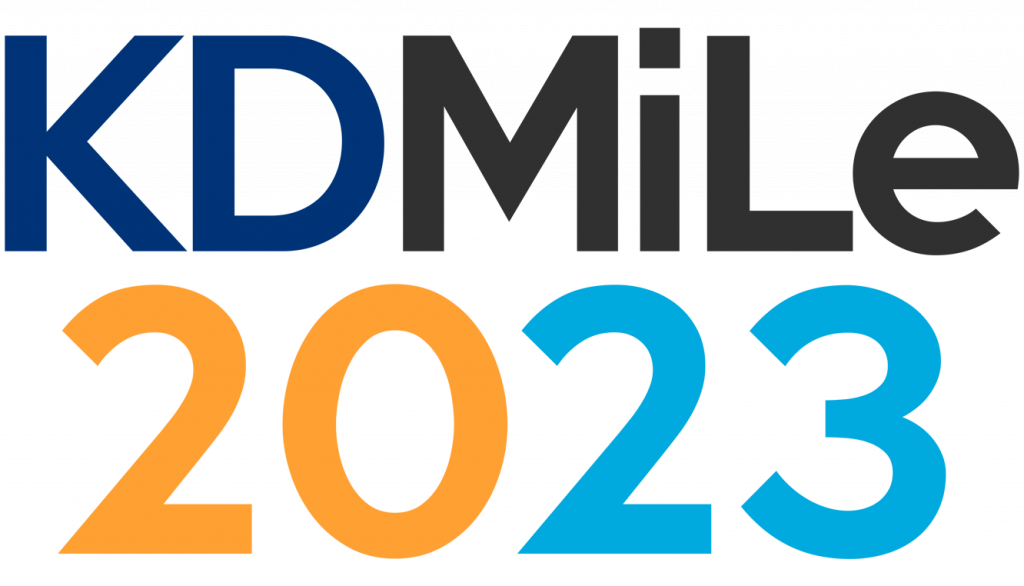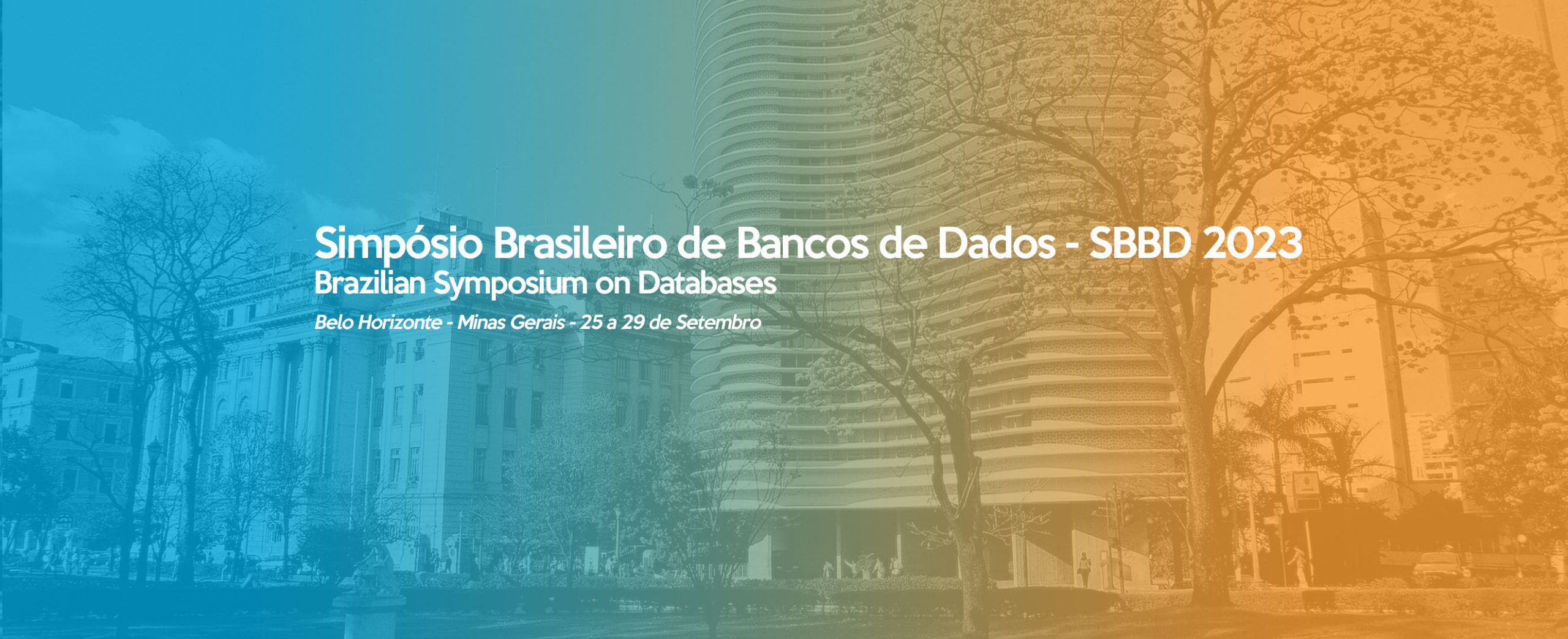
The Symposium on Knowledge Discovery, Mining and Learning (KDMiLe) aims at integrating researchers, practitioners, developers, students, and users to present their research results, discuss ideas, and exchange techniques, tools, and practical experiences – related to the Data Mining and Machine Learning areas. KDMiLe originated from WAAMD (Workshop em Algoritmos e Aplicações de Mineração de Dados) that occurred during five years – 2005 to 2009 – as a Workshop of the Brazilian Symposium on Databases (SBBD).
Since 2013, KDMiLe has been organized alternatively in conjunction with the Brazilian Conference on Intelligent Systems (BRACIS) and the Brazilian Symposium on Databases (SBBD).
This year, 2023, in its eleventh edition, KDMiLe will be held in Belo Horizonte, Minas Gerais, from 25-29 September in conjunction with the Brazilian Symposium on Databases (SBBD). This year KDMiLe is being organized by PUC Minas and Instituto Federal de Minas Gerais.
Important Dates
- Submission deadline: June 4th, 2023
- Notification to authors: July 24th, 2023
- Camera-ready version: July 31st, 2023
Submission & Presentation Guidelines
- Papers may be written in Portuguese or English, but the title, the abstract, and the keywords must be written in English.
- Submissions are reviewed following a single blind review process, i.e., you do not need to hide authors’ names and affiliations.
- The manuscript must not exceed 8 pages. Papers exceeding this limit will be automatically rejected without being reviewed by the Program Committee.
- Papers must be submitted in PDF format. Formats other than PDF will NOT be accepted.
- Latex template available here.
- Papers must be submitted through JEMS.
Papers submitted to KDMiLe must not have been simultaneously submitted to any other forum (conference or journal), nor should they have already been published elsewhere. The acceptance of a paper implies that at least one of its authors will register for the symposium to present it.
Submitted papers will be reviewed based on originality, relevance, technical soundness, and clarity of presentation.
Accepted papers will be published electronically in the KDMiLe proceedings. A preliminary version of the proceedings, including all the accepted papers, will be available to the symposium attendees.
In all past editions, authors of selected papers accepted for presentation in KDMiLe have been invited to submit extended and revised versions of these papers to a special issue of JIDM (Journal of Information and Database Management). This year, we intend to follow this same policy of encouraging the best submissions with publication in an international journal.
Registration
In this edition, registration to KDMiLe will happen along with SBBD. Further details on the SBBD/KDMiLe 2023 registration process can be found here.
Topics of Interest
The KDMiLe Program Committee invites submissions containing new ideas, proposals, and applications in the Data Mining and Machine Learning areas. Below is a list of common topics, although KDMiLe is not limited to them.
In Data Mining
- Association Rules
- Classification
- Clustering
- Data Mining Applications
- Data Mining Foundations
- Evaluation Methodology in Data Mining
- Feature Selection and Dimensionality Reduction
- Graph Mining
- Massive Data Mining
- Multimedia Data Mining
- Multirelational Mining
- Outlier Detection
- Parallel and Distributed Data Mining
- Pre and Post Processing
- Ranking and Preference Mining
- Privacy and Security in Data Mining
- Quality and Interest Metrics
- Sequential Patterns
- Social Network Mining
- Stream Data Mining
- Text Mining
- Time-Series Analysis
- Visual Data Mining Web Mining
- Recommender Systems based on Data Mining
In Machine Learning
- Active Learning
- Bayesian Inference
- Case-Based Reasoning
- Cognitive Models of Learning
- Constructive Induction and Theory Revision
- Cost-Sensitive Learning
- Deep Learning
- Ensemble Methods
- Evaluation Methodology in Machine Learning
- Fuzzy Learning Systems
- Inductive Logic
- Kernel Methods
- Knowledge-Intensive Learning
- Learning Theory
- Machine Learning Applications
- Meta-Learning
- Multi-Agent and Co-Operative Learning
- Natural Language Processing
- Probabilistic and Statistical Methods
- Ranking and Preference Learning
- Recommender Systems based on Machine Learning
- Reinforcement Learning
- Semi-Supervised Learning
- Supervised Learning
- Unsupervised Learning
- Online Learning
Committees
Steering committee
Luiz Henrique de Campos Merschmann (UFLA)
Alexandre Plastino (UFF)
André Carlos Ponce de Leon Ferreira de Carvalho (ICMC-USP)
Wagner Meira Jr. (UFMG)
Ricardo Cerri (UFSCAR)
Program chair
Chair – Aline Paes (UFF) – alinepaes@ic.uff.br
Co-Chair – Eduardo Bezerra (CEFET-RJ) – ebezerra@cefet-rj.br
Local chair
Renato Vimieiro (UFMG) – rvimieiro@dcc.ufmg.br
Program Committee
Alan Valejo Universidade de São Carlos – (UFSCar)
Alexandre Plastino – Universidade Federal Fluminense
Ana Carolina Lorena – Instituto Tecnológico de Aeronáutica
André Ponce de Leon F de Carvalho – ICMC-USP/S.Carlos
André Rossi – São Paulo State University – UNESP
Antonio Parmezan – Univesidade de São Paulo
Aurora Pozo – UFPR
Bruno Nogueira – Universidade Federal de Mato Grosso do Sul
Carlos Eduardo Pantoja – CEFET/RJ
Daniela Barreiro Claro – Federal University of Bahia
Daniela Vianna – Rutgers University
Debora Medeiros – Universidade Federal do ABC
Diego Furtado Silva – Universidade de São Paulo
Douglas Cardoso – CEFET-RJ
Edson Matsubara – Fundação Universidade Federal de Mato Grosso do Sul
Elaine Faria – Federal University of Uberlandia
Elaine Sousa – University of Sao Paulo
Eloize Seno – IFSP
Fabio Lobato – Universidade Federal do Oeste Pará
Fabio Porto – LNCC
Fábio Cozman – USP – Politécnica
Flavia Bernardini – Universidade Federal Fluminense
Francisco De Carvalho – Centro de Informatica – CIn/UFPE
Helena Caseli – UFSCar
Heloisa Camargo – UFSCar
Humberto Razente – Universidade Federal de Uberlandia
João Mari – Federal University of Viçosa
Jonathan Andrade Silva – UFMS – Universidade Federal de Mato Grosso do Sul
Jonice Oliveira – Universidade Federal do Rio de Janeiro (UFRJ)
Jonnathan Carvalho – Instituto Federal de Educação, Ciência e Tecnologia Fluminense
Julio Duarte – Instituto Militar de Engenharia
Julio Nievola – PUCPR
Karla Figueiredo – UERJ
Kate Revoredo – Humboldt-Universität zu Berlin
Leandro dos Santos Coelho – Pontifícia Universidade Católica do Paraná
Leandro Marinho – Federal University of Campina Grande
Leandro Miranda – Blueshift
Leonardo Emmendorfer – Universidade Federal do Rio Grande
Leonardo Tomazeli Duarte – University of Campinas
Leonardo Filipe Ribeiro – Technische Universitat Darmstadt
Levy Boccato – University of Campinas
Luciano Digiampietri – University of Sao Paulo (USP)
Luis Garcia – Universidade de Brasília
Luis Zárate – Pontifícia Universidade Católica de Minas Gerais
Luiz Martins – Universidade Federal de Uberlândia
Luiz Henrique Merschmann – Universidade Federal de Lavras
Marcela Ribeiro – Universidade Federal de São Carlos (UFSCar)
Marcelino Pereira – UERN
Marcelo Albertini Federal University of Uberlandia
Marcelo Finger USP/IME
Marcelo Manzato – University of Sao Paulo
Márcio Basgalupp – UNIFESP
Marcos Bedo – Universidade Federal Fluminense
Marcos Quiles – Universidade Federal de São Paulo
Maria Camila Nardini Barioni – UFU
Marilton Aguiar – UFPEL
Mariza Ferro – Universidade Federal Fluminense
Marlo Souza – Universidade Federal da Bahia – UFBA
Mauri Ferrandin – Universidade Federal de Santa Catarina – UFSC
Mário Benevides – Universidade Federal Fluminense (UFF)
Moacir Ponti – Universidade de São Paulo
Murillo Carneiro – Federal University of Uberlândia
Murilo Loiola – Universidade Federal do ABC
Myriam Delgado – Federal University of Technology of Parana
Nuno David – ISCTE
Patricia Oliveira – University of Sao Paulo
Paulo Cavalin – IBM Research Brazil
Paulo Henrique Pisani – Universidade Federal do ABC (UFABC)
Paulo T. Guerra – Federal University of Ceará
Priscila Lima – UFRJ
Rafael Bordini – PUCRS
Rafael Ferrari – Universidade Estadual de Campinas
Rafael Gomes Mantovani – Federal Technology University of Paraná, Campus of Apucarana
Reinaldo Bianchi – Centro Universitario FEI
Renato Tinos – USP
Ricardo Cerri – Universidade Federal de São Carlos
Ricardo Marcacini – ICMC/USP
Ricardo Rios – Universidade Federal da Bahia
Ricardo Suyama – UFABC
Ricardo Augusto Souza – Fernandes Federal University of São Carlos
Richard Gonçalves – UNICENTRO
Roberto Santana – University of the Basque Country
Rodrigo Barros – Pontifícia Universidade Católica do Rio Grande do Sul
Rodrigo Kishi – Universidade Federal de Mato Grosso do Sul
Romis Attux – Universidade Estadual de Campinas
Ronaldo Prati – Universidade Federal do ABC
Sandra Venske – UNICENTRO – Universidade Estadual do Centro-Oeste
Sílvia Maia – Federal University of Rio Grande do Norte
Sílvio Cazella – UFCSPA
Silvia Botelho – FURG
Solange Rezende – USP/ICMC
Tatiane Nogueira – Federal University of Bahia
Tiago Almeida – Federal University of Sao Carlos (UFSCar)
Valdinei Freire – Escola de Artes, Ciências e Humanidades – Universidade de São Paulo
Vasco Furtado – Universidade de Fortaleza – UNIFOR
Vítor Santos Costa – Universidade do Porto
Viviane Moreira – Universidade Federal do Rio Grande do Sul
